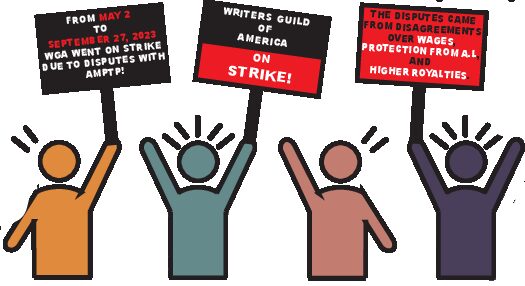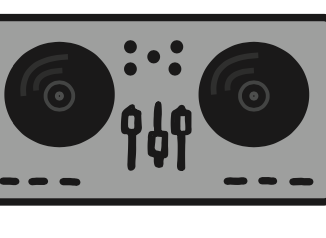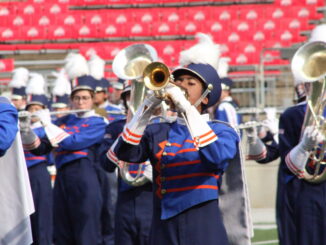
photo credit: Natalia Favila Inacua
These past few months, Hollywood has experienced a shut-down as writers went on strike with goals to receive higher pay and other important values to their work.
On May 2, writers as a part of the Writers Guild of America (WGA) began their strike with support from actors as a part of the Screen Actors Guild-American Federation of Television and Radio Artists (SAG-AFTRA), which put a halt to all their work. Writers were striking for higher wages, a restriction on the use of artificial intelligence (AI), a shift in standards for self-taped auditions and eliminating the usage of mini-rooms, which create a lack in job security, according to The Washington Post.
“I think the most recent advancements in AI caused the strike to finally happen because writers are fearful that their jobs will be replaced, and the replacement will be due to AI using their work to produce new work, which is essentially plagiarism,” Library Specialist and Film Club Adviser Glenn Nunn said. “However, the issue spans much further back. The change to streaming services resulted in many writers being paid less while series budgets increased. So, like most things in life, the short answer is money.”
Because writers are the backbone of many shows, movies and other forms of entertainment, these productions were stopped. Shows such as “Saturday Night Live” and other late-night talk shows canceled episodes and paused production following the strike. Even the production of the new “Wicked” movie had to be shut down just a few days before they were set to finish shooting due to following striking rules and guidelines.
“Writers and actors were unable to do their jobs, and non-writers were asked not to take writers’ jobs (be scabs) so that their strike was valuable. Some shows (the ‘Drew Barrymore Show’ for example) decided to be scabs anyway and were very quickly socially rejected,” junior and President of Film Club Khushi Gagrani said.
There were various rules that writers and actors had to follow in compliance with being members of the WGA and SAG-AFTRA. Some main rules included that WGA members were not allowed to produce any writing, whilst SAG-AFTRA members were not allowed to act or promote their projects, according to NPR.
This inability for writers to write scripts will cause a delay in many shows and movies being released in the future. The strike affects the average person who wants to enjoy more shows and movies, yet nothing can be released.
“The strike definitely had effects on delaying many shows and programming. As consumers we experienced this already with shows that are nightly live shows, but most of us and especially young people will start to see the effects now because of streaming services,” Nunn said. “Many of these series would be airing about now but won’t be because everything was pushed back.”
Strikers tried to reach an agreement with the Alliance of Motion Picture and Television Producers (AMPTP), which is a trade association that represents hundreds of different film and television production companies around the country, according to the AMPTP.
On Sept. 24, an agreement was momentarily reached for the WGA with the AMPTP. A tentative deal included a pay increase, AI restrictions and smaller writing staff, amongst other ideas, according to the LA Times.
“The writers’ minimum wage will rise and there are various other compensation packages with extra benefits as well,” Nunn said.
On Oct. 10, the agreement went on to be ratified, which put an end to the strike that had gone on for over five months. This three-year contract will be effective through May 1, 2026, according to AP News.
This agreement will set standards of overall better treatment for writers and put more value to all the work that they do.
Actors are continuing to strike, though, as their agreement fell through on Oct. 11. They demanded viewership bonuses that would “increase compensation for performers whose projects are very successful, a measure that would require the studios to make public the viewership for streaming content — something they’ve resisted,” according to Vox. The talk of agreement between SAG-AFTRA and AMPTP has now been suspended.
According to AMPTP’s statement, they said, “It is clear that the gap between the AMPTP and SAG-AFTRA is too great, and conversations are no longer moving us in a productive direction.”
Writers have received support to get the treatment that they deserve in their industry. However, the effects of this strike will still be felt for months and years to come.
“I think for now it is a win and will protect writers. However, long term is hard to say due to the use of AI which isn’t going anywhere,” Nunn said.


